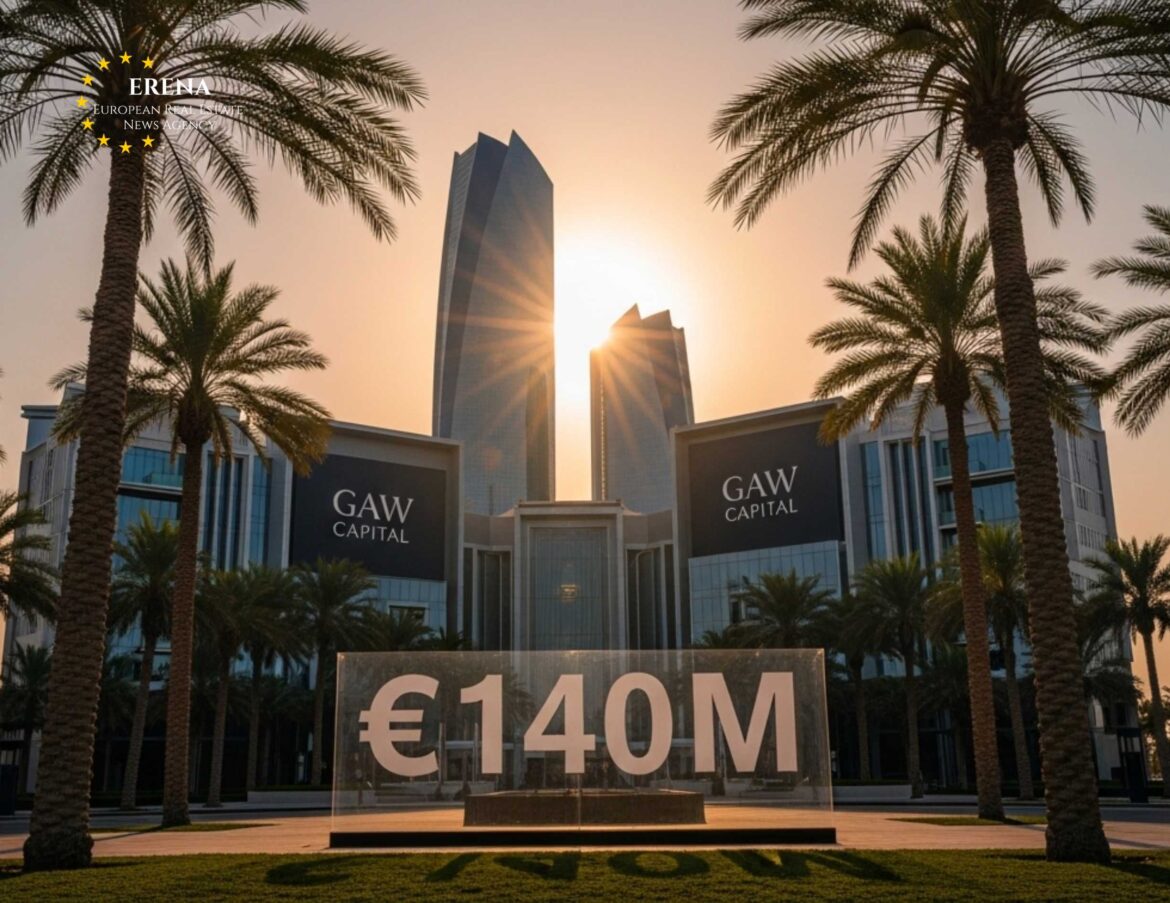Gaw Capital Partners, a global real estate private equity firm, has made a strategic move into the Middle East with the acquisition of a premium residential asset in Abu Dhabi. The €140 million investment marks the company’s official entry into the MENA (Middle East and North Africa) region and reflects growing institutional interest in the booming real estate market of the United Arab Emirates.
A Strategic First Step in Abu Dhabi
Gaw Capital has acquired a residential building in the Mamsha Gardens development, located on Saadiyat Island, one of the most prestigious and fastest-growing districts in Abu Dhabi. The property is currently under construction, with completion expected by 2028. It will feature 71 residential units, including one-, two-, and three-bedroom apartments as well as two- and three-bedroom townhouses.
The building covers approximately 16,350 square meters of gross floor area. Units will offer private terraces or balconies, views of landscaped courtyards, and direct access to the Mamsha beachfront—a location known for its combination of luxury living and cultural significance.
Why Abu Dhabi?
Abu Dhabi is emerging as a major destination for international real estate investment, offering a stable economy, favorable taxation, and high quality of life. Saadiyat Island, in particular, has become a magnet for developers and investors alike due to its integrated urban planning, cultural landmarks, and pristine coastal environment.
The island is home to globally recognized institutions such as the Louvre Abu Dhabi, and upcoming developments include the Guggenheim Abu Dhabi and Zayed National Museum. These cultural drivers have not only enhanced tourism but have significantly increased the desirability of residential real estate in the area.
Partnering with Aldar Properties
The developer of Mamsha Gardens is Aldar Properties, the leading real estate firm in the UAE. The partnership with Aldar underscores Gaw Capital’s confidence in local expertise and operational execution. Aldar is responsible for the design and development of the building and has a reputation for delivering high-quality, sustainable, and architecturally distinctive projects across the Emirates.
The collaboration is mutually beneficial: Aldar gains exposure through international investment, while Gaw Capital ensures the project meets global standards for residential development, sustainability, and asset performance.
Official Comments on the Investment
Kristina Gaw, Managing Partner and Head of Capital Markets at Gaw Capital, emphasized the significance of the move:
“We have been evaluating the Middle East for several years and believe the timing is right. Mamsha Gardens is not just a residential asset—it is a gateway to one of the world’s most dynamic markets. We are confident in the long-term fundamentals of Abu Dhabi and see this as a platform for future regional growth.”
From the developer’s side, Aldar CEO Talal Al Dhiyebi commented:
“This transaction highlights the strength of Aldar’s development capabilities and the attractiveness of Abu Dhabi’s real estate market to global investors. In Q1 2025, 87% of our UAE sales were to international buyers—a record figure that reflects growing demand for premium residential offerings.”
Abu Dhabi’s Real Estate Market in Focus
Abu Dhabi has seen a significant increase in real estate activity over the past year. According to market research firms, total residential sales volume grew by 59% in 2024 compared to the previous year. Saadiyat Island alone recorded a 30% increase in property prices and a 14% rise in rental yields.
Key factors contributing to this growth include:
- Increased foreign ownership allowances
- Expedited residency programs linked to real estate investment
- Attractive yield-to-risk ratios
- Strong infrastructure and urban planning initiatives
Moreover, the Emirate’s emphasis on culture, education, and sustainability has made it a top choice for wealthy individuals and expatriates seeking lifestyle-driven investments.
Gaw Capital’s Broader Strategy
Gaw Capital’s entry into Abu Dhabi aligns with its global investment thesis of targeting undervalued or high-growth markets with strong urban fundamentals. After establishing itself in Asia, North America, and parts of Europe, the firm is now turning its attention to the Middle East as a promising frontier for institutional-grade real estate investments.
The company plans to establish a permanent presence in the UAE and is actively exploring opportunities in Saudi Arabia, Qatar, and Bahrain. Its strategic focus includes not just residential properties but also mixed-use developments, hospitality assets, and logistics infrastructure.
A key component of Gaw Capital’s approach is ESG integration. The firm aims to embed environmental, social, and governance principles across its Middle East portfolio, targeting energy efficiency, smart building technologies, and green certifications such as LEED and WELL.
A New Era for MENA Real Estate
This investment signals a broader trend of global capital flowing into the Gulf region. With geopolitical stability, favorable regulatory changes, and robust macroeconomic fundamentals, the Middle East is becoming an increasingly vital part of institutional investment strategies.
Abu Dhabi, in particular, is positioning itself as a cultural and economic hub, not only within the UAE but across the region. Its real estate market offers both strong rental yields and long-term capital appreciation potential—qualities highly valued by private equity firms and sovereign wealth funds.
Conclusion
Gaw Capital’s €140 million acquisition of a residential building in Abu Dhabi’s Mamsha Gardens is more than a high-profile transaction—it marks a strategic shift in how global investors view the Middle East. With Saadiyat Island’s cultural prominence, Aldar’s execution capabilities, and Gaw Capital’s international experience, the project is poised to deliver strong returns and set the tone for future investment in the region.
As Abu Dhabi continues to evolve as a world-class city, it is clear that institutional real estate investment will play a central role in shaping its skyline, communities, and long-term economic trajectory.

